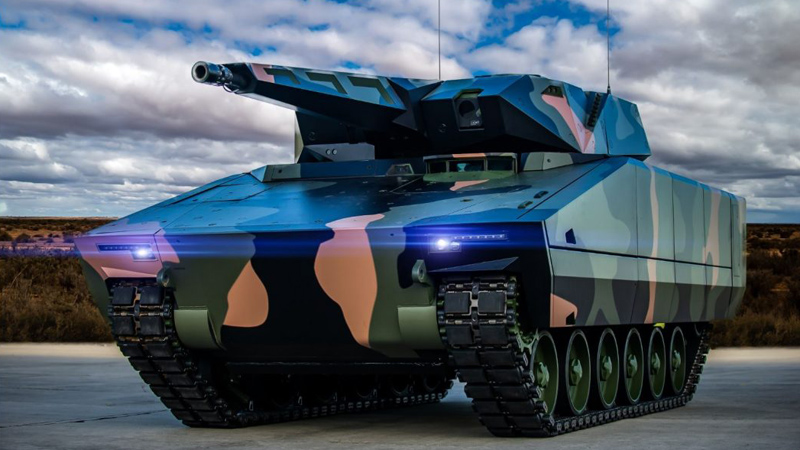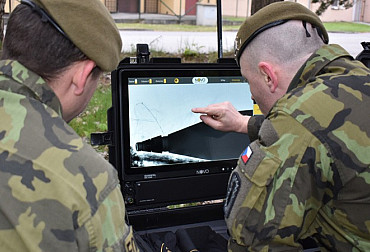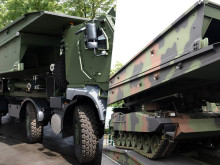Oliver Mittelsdorf: This year's deletion of armoured vehicles from the budget was disappointing, but I am positive about the future
The tender for the delivery of 210 tracked Infantry Fighting Vehicles for the Czech Army, worth CZK 52 billion, is rightly one of the most watched tenders in the history of the Czech Armed Forces. Let us recall that the tender has been running for several years and has not been concluded yet. Among other things, the tender process was affected by anti-austerity measures, e.g. last year, when the functional sample tests were postponed until the end of April and the beginning of May 2021. Not only because of this postponement, but also because of other parallel deadlines, it was already clear that the contract could not be signed before the date of the regular elections, which became definitely certain the moment the bidders asked for a postponement of the deadline for submitting the final bids. On 5 November, the expert committee of the Ministry of Defence announced that none of the three reputable companies, i.e. the British-Swedish BAE Systems, the American-Spanish GDELS and the German Rheinmetall, met the requirements of the contracting authority. Due to the end of the mandate of the then Minister of Defence Lubomir Metnar, the further procedure was left to the new management of the ministry. Now the future of the multi-billion dollar tender is in the hands of the new Defence Minister Jana Černochová, who took office on 18 December last year.
 Picture: Lynx KF41 (pictured) is one of the contenders in the Czech Republic's tracked BMP renewal programme | Rheinmetall
Picture: Lynx KF41 (pictured) is one of the contenders in the Czech Republic's tracked BMP renewal programme | Rheinmetall
Regarding the acquisition of the IFVs, the new defence minister, Jana Černochová, said during her January visit to the 7th Mechanised Brigade that she was still familiarising herself with the history of the contract, which dates back to 2013, and added that discussions had already taken place with representatives of the Army and the deputy for the management of the armaments and acquisitions section of the Ministry of Defence, Lubor Koudelka, on what alternatives were available in the tender. Among other things, Černochová learned that in connection with the tender, bids, not bidders, were eliminated at the end of last year, which means that new bids may be priced differently than the original bids received from the bidders, which has implications for the state budget. Therefore, Černochová said, the next step in the tender for the new IFVs is a clear legal analysis. "All the companies that entered the tender have already invested considerable funds, in the order of tens to hundreds of millions of crowns, and if we make the wrong decision at this current imaginary crossroads, it could cost the Czech Republic a lot of money in arbitrations," Černochová said at the time. The new defence minister confirmed the need for both the IFVs and tanks during her visit to 7th brigade and said that it is not possible to modernise old Soviet machines indefinitely. "We want to recruit soldiers who want to use 21st century equipment. So the priority is to equip the 7th MB with the appropriate equipment and number of people," Cernochová said. She added that she does not lack the courage to make some decisions, but she must be sure that if she decides to do something, she will not cause more damage than if she had made a different choice.
 Picture: Oliver Mittelsdorf, Rheinmetall's Vice President of Sales | Oliver Mittelsdorf Archive
Picture: Oliver Mittelsdorf, Rheinmetall's Vice President of Sales | Oliver Mittelsdorf Archive
We already asked Tommy Gustafsson-Raska, CEO of BAE Systems Hägglunds (competing with the CV90 MkIV in the tender for new tracked IFVs for the Army), about the progress of the tender for new tracked IFVs for the Army at the end of last year. We have now contacted Rheinmetall's VP Sales (in the tender for new IFV for the Army, they are competing with the Lynx KF41), Oliver Mittelsdorf.
Bids have been eliminated in the ongoing tender for new IFVs for the Army, which means that new bids may be priced differently. How prepared are you for the continuation of the tender and are you able to maintain your original price offer?
The MoD's announcement on 5 November last year was a bit frustrating, but that's the way life goes. We are continuing our activities and preparing for the next steps. Since the announcement, we have not had time to be idle at all as we have been very busy with Lynx and our other programs. The Czech tender for Infantry Fighting Vehicles is important to us - not only for commercial reasons. Because if the domestic Ministry of Defence were to opt for Lynx, it would significantly support the modernisation of mechanised forces across Central Europe, which would also significantly strengthen the cooperation capabilities of the defence industry, which would thus be able to compete in the global market. As of 1 September, we have responded to the MoD's offer and will abide by the terms we have proposed.
After all, a few years have passed since the Lynx KF41 was originally introduced. Have there been any further technological developments with the Lynx?
A significant portion of our budget goes into development. Many of our employees are engineers who are directly involved in this area. So we are constantly improving technology, design, testing and directly producing combat vehicles, Lynx specifically, for Hungary, Australia, the US and other countries. You may have noticed that on October 18, 2021, we introduced the Lynx CSV combat support vehicle in Australia. I think that is an absolutely fantastic development.
Do you believe that Lynx could succeed in the tender for new IFVs for the Czech Armed Forces?
Yes.
In 2020, the Hungarian army chose Lynx as part of its rearmament. In addition to the Czech Republic, the vehicle is also competing in the Slovak, American and Australian tenders for new IFVs. How do you see your chances in these tenders?
I feel reasonably confident about the Lynx programmes currently underway in Slovakia, Australia and the US. The LYNX KF41 is a state-of-the-art platform that incorporates the latest generation of technologies for lethality, protection and mobility, while offering a large weight margin for future upgrades. Platforms that were developed in the 1980s or 1990s will soon reach their limits in terms of upgradeability and will run into problems caused by obsolescence.
How is the cooperation between Rheinmetall and the Czech defence industry currently developing?
Industrial partnerships are a key element of all our activities in Europe and worldwide. We are continuing discussions with several local companies about cooperation. This is not only about Lynx, but also about our other products. We intend to establish comprehensive cooperation with local companies to improve our global supply chain for the benefit of our customers.
What does the recent announcement by the Minister of Defence, Jana Černochová, that she will cut the purchase of infantry fighting vehicles from this year's budget mean for you?
This announcement was disappointing for me personally, as my entire team and I have invested a lot of time and effort into the IFV programme over the last few years. However, as the Minister has said, the programme has not been cancelled, so I am positive about the future and look forward to our further potential involvement.





















